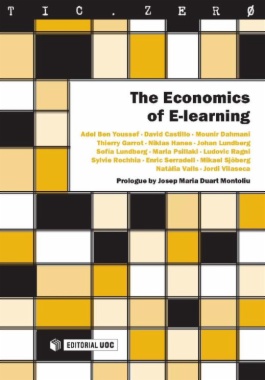The economics of e-learning was identified as a key priority for virtual campuses in the consultation workshop held in Brussels on 2004. This special issue shows the theoretical framework defined and some of the results obtained within the project, funded by the European Commission.
- Cover
- Title page
- Copyright page
- Our contract
- Table of contents
- Prologue
- Introduction a theoretical framework for the economics of e-learning. D. Castillo-Merino, M. Sjöberg
- Positive externalities of e-learning
- E-learning in higher education
- eLene-EE (Economics of e-learning)
- WP 1.Cost-benefit analysis of net based higher education
- WP 2.Student performance of e-learning
- WP 3.Indicators of e-learning
- WP 4.Digital divides and e-learning
- References
- About the authors
- E-learning as a regional policy tool: Principless for a cost benefit analysis. N. Hanes, S. Lundberg
- 1.Introduction
- 2.Cost-benefit analysis
- 3.A case study of a nursing programme
- 4.Discussion
- References
- About the authors
- E-learning and labour market: wage-premium analysis. D. Castillo-Merino, J. Vilaseca, E. Serradell, N. Valls
- 1.Introduction
- 2.Costs and benefits from education
- 3.Estimating the returns to education. Theoretical models
- 4.Education and wages:the role ofICT in the relationship between e-learning and labour productivity
- 5.E-learning skills and productivity: the case ofUOC’s degree students
- References
- About the authors
- Do online students perform better than a face-to-face students? Reflections and short review of some empirical findings. J. Lundbergm D. Castillo, M. Dahmani
- 1.Introduction
- 2.Methodological issues
- 3.Some empirical results
- 4.Final reflections
- References
- About the authors
- The impact of ICT on student performance in higher education: Direct effects, indirect effects and organisation change. A. Ben Youssef, M. Dahmani
- Introduction
- 1.ICT and students’performance: no clear direct effects
- 2.Student performance:indirect effects
- 3.ICT and student performance:an enormous lack oforganisational change
- References
- About the authors
- Describing e-learning development in european higher education institutions using a balanced scorecard. T. Garrot, M. Psillaki, S. Rochhia
- 1.Introduction
- 2.Presentation ofthe BSC
- 3.E-learning development offour4 European universities
- 4.Conclusion and discussion
- References
- About the authors
- Uses of information and communication technologies in Europe's higher education institutions: From digital divides to digital trajectories. A. Ben Youssef, L. Ragni
- 1.Introduction
- 1.The three levels ofeducational digital divides
- 2.From digital divides to digital trajectories: explaining the differences
- References
- About the authors

